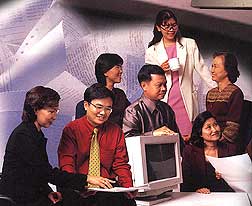

Discussion& Analysis
 The
cost of goods sold was Baht 583 million in 2000, an increase of Baht
47 million from the previous year. During the year 2000, the company
bought long on newsprint when prices were well below US$ 460 a tonne.
The U.S. Dollar exchange rate had also been fixed by obtaining forward
cover at an average of Baht 38.80 for one U.S. Dollar. Overall, the
price of newsprint in 2000 was more or less the same as in 1999, with
the increase mainly coming from higher pagination. Magazines handled
by the joint venture experienced a large increase in paper cost. Similar
increases also affected the Commercial Printing division. Additionally,
magazine print-runs and pagination also contributed significantly
to higher costs in the year 2000.
The
cost of goods sold was Baht 583 million in 2000, an increase of Baht
47 million from the previous year. During the year 2000, the company
bought long on newsprint when prices were well below US$ 460 a tonne.
The U.S. Dollar exchange rate had also been fixed by obtaining forward
cover at an average of Baht 38.80 for one U.S. Dollar. Overall, the
price of newsprint in 2000 was more or less the same as in 1999, with
the increase mainly coming from higher pagination. Magazines handled
by the joint venture experienced a large increase in paper cost. Similar
increases also affected the Commercial Printing division. Additionally,
magazine print-runs and pagination also contributed significantly
to higher costs in the year 2000.
Selling and administration expenses went up from Baht 269 million in 1999 to Baht 283 million in 2000. The Baht 14 million increase was primarily due to the payroll, benefits and depreciation, partly reduced by an improved bad debts situation. Bad debts provision dropped significantly in the past year, from Baht 17 million in 1999 to Baht 2 million in 2000.
The effective tax rate for the whole group was 31.9 per cent in 2000, an increase of 2.0 per cent from the previous year, due to the joint venture, where cumulative losses had been fully used up in the early part of 2000.
Net profit after tax increased from Baht 46.3 million to Baht 150.5 million in 2000. Better profitability was mainly from increased advertising revenue and better control on major cost items.
LIQUIDITY
Despite a large inventory of newsprint at the end of 2000, the company's financial position remains strong with a debt-free balance sheet. In the year 2000, the company continued to implement a strict credit policy for advertising and publication sales. The increased cash inflow arose mainly from the higher net profit. Working capital was kept under control in both trade account receivables and trade account payables. Inventory was higher as a result of the company's purchasing strategy to fix the cost of newsprint for 2001. Capital spending in 2000, mostly on IT-related projects and replacement of old vehicles, came to Baht 45.5 million -- a reduction of Baht 23.0 million from the previous year.
With the improved liquidity, three dividend payments of Baht 75 million each were effected in 2000. The first payment was made on 14 January 2000, and the second payment was the 1999 final dividend, approved at the AGM in April 2000 and paid on 25 May 2000. The last one was an interim dividend, distributed to shareholders on 24 November 2000.
NEW ACCOUNTING STANDARDS
During the year 2000, the company adopted new Thai Accounting Standards (TAS) as they became effective, but impact on operating results was minimal. The impact of TAS no. 46, which relates to accounting for joint ventures, necessitated the previous year's consolidated balance sheet to be restated from full consolidation to proportionate recognition.
©
The Post Publishing Public Co., Ltd. 2001
We welcome comments to Webmaster
Advertising enquiries to Internet
Marketing